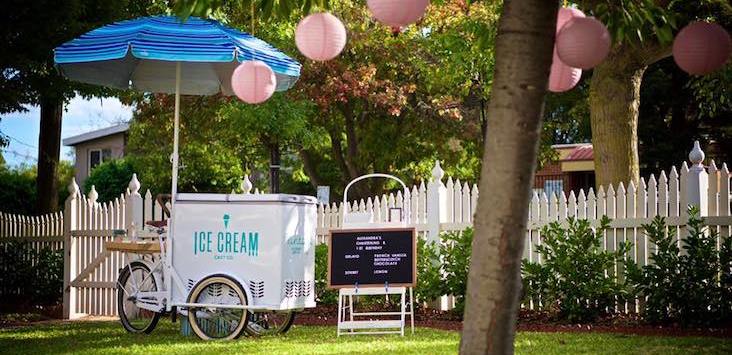
A Short Batch ice cream cart. Source: Facebook/Matt Irwin Photography.
The Australian wedding industry is underpinned by a large army of micro-businesses — many of which won’t survive the economic crisis caused by the COVID-19 pandemic, according to one business owner.
Scott Kilmartin is a prominent Australian e-commerce consultant and the founder of Melbourne-based Short Batch Ice Cream Co, a nostalgic, gourmet ice-cream vendor that specialises in weddings.
Short Batch has been operating since 2013 and currently employs six casual workers — a mix of university students, hospitality workers and backpackers, who each do between two and three shifts a week.
Until now, the business has typically served gelato from its five vintage carts and ice-cream truck, which Kilmartin restored himself, at between 180 and 200 weddings and functions each year, including at the Grand Prix and Melbourne Spring Racing Carnival.
But Kilmartin tells SmartCompany those event bookings are now quickly disappearing during what would normally be the peak wedding season.
And the situation for wedding vendors like Kilmartin is only likely to become more dire, following an announcement from Prime Minister Scott Morrison on Tuesday that weddings in Australia will now be restricted to gatherings of just five people.
An estimated 56,000 businesses operate in the Australian wedding industry, according to an industry report from 2019, and these businesses, on average, employ two people each.
“Last week, which seems like last year now, we had 41 events cancel in 72 hours,” says Kilmartin.
“Another 20 postponed indefinitely. These were all corporate events.
“So far nearly 100 events have been cancelled. Many of those won’t happen down the track — they’re gone.
“We average five enquiries a day; since early-March I’ve had three enquiries in total. No one is making wedding plans now for this year. It’s all very ‘wait and see’,” he adds.
An average wedding for Short Batch is for 110 guests, priced at $745 for 90 minutes of service.
“We’re as much in the theatre business as the ice-cream business,” says Kilmartin.
“It’s the cart as a prop and backdrop adding a nostalgia vibe to weddings. We scoop on beaches, wineries, farm sheds — all the boho, non-traditional places.
“The majority of the wedding season runs from October through May; March is the peak wedding month.”
Kilmartin describes himself as “fortunate” as Short Batch is his side business, which accounts for 40% of his income.
“I have an e-commerce consultancy RIVETING as my main business, but even it has slowed with companies so frazzled by the speed of COVID-19’s impact [that] they’re put all work on hold,” Kilmartin says.
“I expect that to come back shortly once things calm down.”
However, he says many other operators in the wedding industry “won’t have a buffer of cash to hold them over” as all of their bookings are cancelled or postponed.
“I expect many will go under,” he says.
“The wedding industry, from the wedding car companies, to floral arrangers, photographers and celebrants, are mostly micro-businesses.
“These are the blue-collar operators that make the industry tick.”
The ripple effects will also be significant, says Kilmartin.
“I buy my gelato from a fabulous company Gelati Sky, my cones from another, rent two-plus vans a week to take carts to the events. That’s all stopped dead,” he explains.
Kilmartin is clear about what kind of assistance governments need to provide to small businesses, and the answer is not low-interest loans or payment deferrals, he says.
“The government needs to help both businesses and casual staff in these businesses,” he says.
“Businesses can cut overheads to a point, [but] rent on facilities still has to be paid.
“Leases on vehicles and equipment, insurance — many of these payments will fall due on April 1, and for many businesses, this will be no joke.
“Low-interest loans to SMEs isn’t the answer. They still have to be paid back and with no or little revenue for many months to come. That’s an added, stressful burden.
“Cash injections, not deferred tax or BAS payments, are what is required. Or many SMEs won’t be around when we get through this period.
“Running a small business is stressful at the best of times, and more so now with revenue falling off a cliff and concerns around the health and livelihood of staff,” he adds.
NOW READ: Coronavirus stimulus: When will small businesses actually see some cash?


COMMENTS
SmartCompany is committed to hosting lively discussions. Help us keep the conversation useful, interesting and welcoming. We aim to publish comments quickly in the interest of promoting robust conversation, but we’re a small team and we deploy filters to protect against legal risk. Occasionally your comment may be held up while it is being reviewed, but we’re working as fast as we can to keep the conversation rolling.
The SmartCompany comment section is members-only content. Please subscribe to leave a comment.
The SmartCompany comment section is members-only content. Please login to leave a comment.